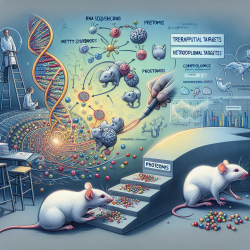Rett syndrome (RTT) is a complex X-linked neurodevelopmental disorder primarily affecting females, characterized by a period of normal development followed by a loss of motor and cognitive skills. It is predominantly caused by mutations in the MECP2 gene, which encodes the transcriptional regulator MeCP2. This protein plays a critical role in neuronal function and development.
The Importance of Multi-Omics Approaches
Recent advancements in RNA sequencing (RNA-Seq) and proteomics have allowed researchers to delve deeper into the molecular underpinnings of RTT. By comparing transcriptomic data with proteomic data, scientists can gain a more holistic understanding of the disease's pathophysiology. This approach helps identify not only changes at the gene expression level but also alterations in protein abundance that may not directly correlate with mRNA levels due to post-transcriptional modifications.
Key Findings from Recent Research
The study "RNA sequencing and proteomics approaches reveal novel deficits in the cortex of Mecp2-deficient mice, a model for Rett syndrome" provides significant insights into RTT. Researchers performed comprehensive transcriptome-proteome comparisons using wild-type and symptomatic RTT mouse models. Key findings include:
- Disruption in Cellular Metabolism: Both RNA metabolism and proteostasis are disrupted in RTT models. Specific pathways affected include monoamine metabolism and cholesterol synthesis.
- Novel Protein Targets: Hundreds of novel protein targets were identified, many of which were validated using Western blot analysis. These proteins are implicated in various cellular processes such as calcium signaling and cytoskeletal structure.
- Aberrant Myelination and Inflammation: The study highlights issues with myelination and inflammation in RTT models, suggesting these as potential areas for therapeutic intervention.
Implications for Practitioners
For practitioners working with RTT patients or conducting research on neurodevelopmental disorders, these findings offer several avenues for exploration:
- Therapeutic Target Identification: The identification of disrupted pathways provides potential targets for therapeutic intervention. Practitioners can explore treatments that address specific metabolic or signaling disruptions highlighted by the study.
- Further Research Directions: The study encourages further exploration into how these molecular changes translate to clinical symptoms. Understanding the connection between molecular dysfunctions and clinical presentations can lead to more effective treatments.
- Integration into Clinical Practice: As new therapies are developed based on these findings, practitioners should stay informed about advancements to integrate evidence-based practices into patient care effectively.
The Future of Rett Syndrome Research
This research exemplifies how integrating different scientific approaches can enhance our understanding of complex disorders like RTT. As technology advances, continued collaboration between transcriptomics and proteomics will be crucial for uncovering new therapeutic strategies.
To read the original research paper, please follow this link: RNA sequencing and proteomics approaches reveal novel deficits in the cortex of Mecp2-deficient mice, a model for Rett syndrome.










